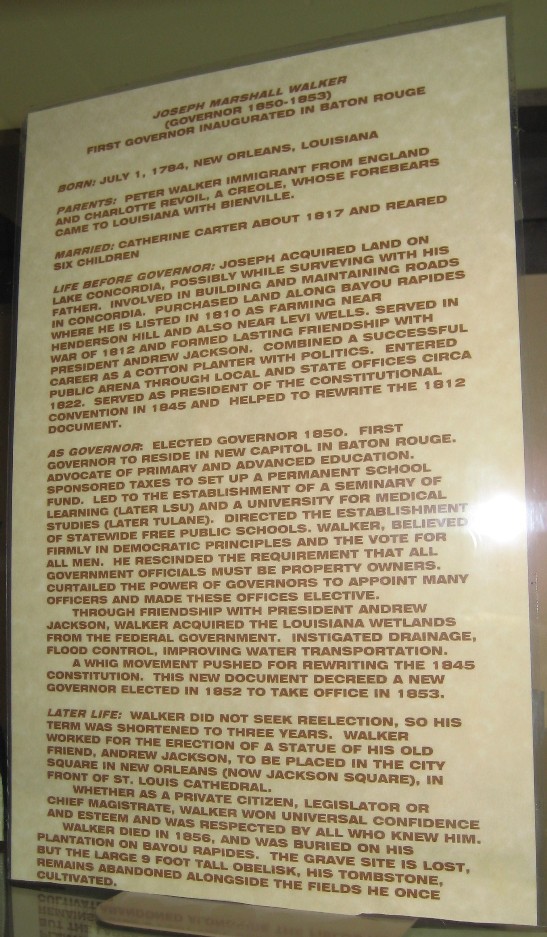|
Joseph Marshall Walker Collection
Alexandria
Genealogical Library
503 Washington Street
Alexandria, La. 71301
Librarian Helen
Sorrell graciously allowed these pictures to document a part of the library
collection related to Governor Walker.
This historical
sign stands in front of the Alexandria Historical & Genealogical Library and
Museum.

ALEXANDRIA
LIBRARY
This site,
located in the town's center square, was set aside for public
use on the
original town plat commissioned by Alexander Fulton in
1805.
The building was constructed solely for advancement of culture
and learning
in 1807 by Caldwell Brothers, Contractors, and Crosby &
Henkel of New
Orleans, Architects. It replace an earlier library
burned by Gen.
Nathaniel Banks' federal troops May 13, 1864. Area
businessman S. S.
Bryan matched a $10,000.00 grant from Pittsburg
philanthropist Andrew
Carnegie. The funds were given for a free public
library with the
stipulation that the City provide a "site and maintenance
forever." An
accepting ordinance was adopted by Alexandria's Board of
Aldermen May 7,
1907. The Alexandria City Council in 1971 adopted a
resolution
designating the building as The Alexandria Historical and
Genealogical Library and Museum.
It was restored as a Bicentennial
project. Through the date of the
placing of this marker, 1990, the building remains in public ownership as
the City's only public building over 75 years old used for its original
purpose, It was placed on the National
Register of Historic Places
January 19, 1989.
Sponsored by
Dorothy Tudor McWhorter
The biography
below is from the library collection.

Joseph Marshall Walker
(Governor
1850 - 1853)
First Governor Inaugurated in Baton Rouge
BORN: July 1, 1784, New Orleans,
Louisiana
PARENTS: Peter Walker
immigrant from England
and Charlotte Revoil, a Creole, whose forebears
came
to Louisiana with Bienville.
MARRIED: Catherine Carter about
1817 and reared six children.
LIFE BEFORE GOVERNOR: Joseph
acquired land on
Lake Concordia, possibly while surveying with his
father.
Involved in building and maintaining roads
in Concordia. Purchased
land along Bayou Rapides
where he is listed in 1810 as farming near
Henderson Hill and also near Levi Wells. Served in
War of 1812 and
formed lasting friendship with
President Andrew Jackson. Combined a
successful
career as a cotton planter with politics. Entered
public
arena through local and state offices circa
1822. Served as president
of the constitutional
convention in 1845 and helped to rewrite the 1812
document.
AS GOVERNOR:
Elected Governor in 1850. First
Governor to reside in new capitol in
Baton Rouge.
Advocate of primary and advanced education.
Sponsored
taxes to set up a permanent school
fund. Led to the establishment of a
seminary of
learning (later LSU) and a university for medical
studies (later
Tulane). Directed the establishment
of statewide free public schools.
Walker, believed
firmly in democratic principles and the vote for
all men.
He rescinded the requirement that all
government officials must be property
owners.
Curtailed the power of governors to appoint many
officers and
made these offices elective.
Through friendship
with President Andrew
Jackson, Walker acquired the Louisiana wetlands
from
the federal government. Instigated drainage,
flood control, improving
water transportation.
A Whig movement pushed for
rewriting the 1845
constitution. This new document decreed a new
Governor elected in 1852 to take office in 1853.
LATER LIFE: Walker
did not seek reelection, so his
term was shortened to three years.
Walker
worked for the erection of a statue of his old
friend, Andrew
Jackson, to be placed in the city
square in New Orleans (now Jackson
Square), in
front of St. Louis Cathedral.
Whether as a private citizen, legislator or
chief magistrate, Walker won
universal confidence
and esteem and was respected by all who knew him.
Walker died in 1856, and was buried on his
plantation on Bayou Rapides.
The grave site is lost,
but the large 9 foot tall obelisk, his tombstone,
remains abandoned alongside the fields he once
cultivated.
Alexandria
Genealogical Library
Governor
Joseph Walker Collection
continues on the
Next page (in progress)
| 


